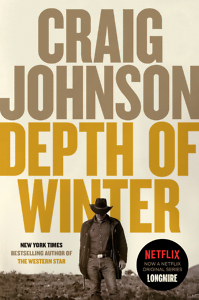An Occupational Hazard
In Depth of Winter, Craig Johnson puts Sheriff Walt Longmire in a different cold place
Sinclair Lewis once wrote, “Winter is not a season, it’s an occupation.” The home jurisdiction of Sheriff Walt Longmire, Craig Johnson’s renowned character, is the fictional Absaroka County, Wyoming, where winters are long, deep, and full of danger. In Depth of Winter, Longmire travels south of the border to face another in a series of grave challenges (chronicled so far in twenty books), each more personal than any other. And this time, the cold isn’t physical: Longmire must survive the winter landscape in his soul.

To the legion of Longmire fans, whether in print or on television, the sheriff and his friends, coworkers, and family are close personal acquaintances. They are the main reason to read the stories, and not the complexity of the mysteries or the uncertainty of their outcome. Like all successful detective series, from Doyle’s Sherlock Holmes to Grafton’s Kinsey Millhone, Johnson’s Longmire saga brings fans back to spend time with beloved characters, in this case Walt; his best friend, Henry Standing Bear; undersheriff Victoria “Vic” Moretti; and his former boss, Lucian Connally.
As loyal readers know, Walt has recently become a proud grandfather. His daughter, Cady, gives birth to a baby girl in a story arc that provides an old enemy, drug kingpin Thomás Bidarte, the opportunity to truly hurt Walt. In the previous Longmire novel, The Western Star, Cady disappears, and everyone knows where she has been taken. As Depth of Winter opens, Walt is on the Mexican border, contacting men and women who want to destroy a cartel leader they call a “monster among monsters” and help Sheriff Longmire at the same time.
Walt Longmire is a famously well-educated sheriff, an erudite mountain of a man who can just as easily quote Shakespeare as break a bad guy’s arm. In his first borderlands trial he must evade U.S. authorities who want him to stay home while they track his missing daughter. He makes his break in classic Longmire fashion, using a battered copy of an Ambrose Bierce biography as a prop. Yes, that Ambrose Bierce, he of The Devil’s Dictionary, who vanished in Mexico in 1914 while covering the Mexican Revolution. The irony is not lost on Walt, who is soon trying desperately not to join Bierce wherever Bierce ended up.
 Craig Johnson, whose Longmire novels and short stories have won numerous awards, has imbued his principal creation with many lovable qualities, including a rashness of behavior that almost always gets him in more trouble than is strictly necessary. His Mexican adventure is no exception, and the altruistic sheriff is soon going out of his way to help people, though his efforts would be better directed elsewhere. When another character calls attention to this self-defeating behavior, Walt notes, “That’s kind of my trademark, the foolish thing.”
Craig Johnson, whose Longmire novels and short stories have won numerous awards, has imbued his principal creation with many lovable qualities, including a rashness of behavior that almost always gets him in more trouble than is strictly necessary. His Mexican adventure is no exception, and the altruistic sheriff is soon going out of his way to help people, though his efforts would be better directed elsewhere. When another character calls attention to this self-defeating behavior, Walt notes, “That’s kind of my trademark, the foolish thing.”
While doing the foolish thing, he tries to avoid killing. He has seen enough death in his long career, beginning with Vietnam, and he would rather leave a bad guy alive. “No, I’m not a killer,” Walt tells an ally, “at least not when I don’t have to be. I’ve learned over the years that killing people is just lazy – better to use your imagination.” This fertile imagination is exactly what Walt must use to confront the worst bad guy ever, a man who commands an army in an isolated mountain village in the middle of a scorching desert.
Depth of Winter puts Walt alone in the wilderness of Mexico, isolated from his usual support system. Henry and Vic are back home guarding his granddaughter, and Cady is held captive. Walt finds new friends, but this is mostly a solo outing, in which his desire to avoid killing is put to the ultimate test. His child has been taken, and the coldness he feels is worse than anything the snows of Wyoming can dish out: “You find that kernel of madness at an early age, and if you’re lucky you start building up a callus around it, a tough layer of humanity that holds it at bay, because it’s just too dangerous to allow it to escape.” This is the occupational hazard of the peace officer-and the winter of discontent that Walt must overcome.

A Michigan native, Chris Scott is an unrepentant Yankee who arrived in Nashville more than twenty-five years ago and has gradually adapted to Southern ways. He is a geologist by profession and an historian by avocation.


